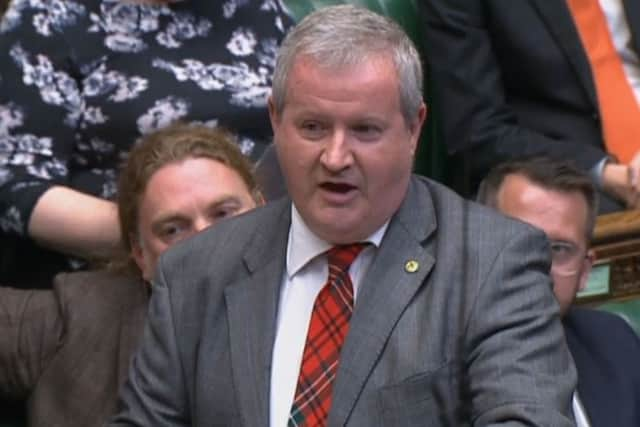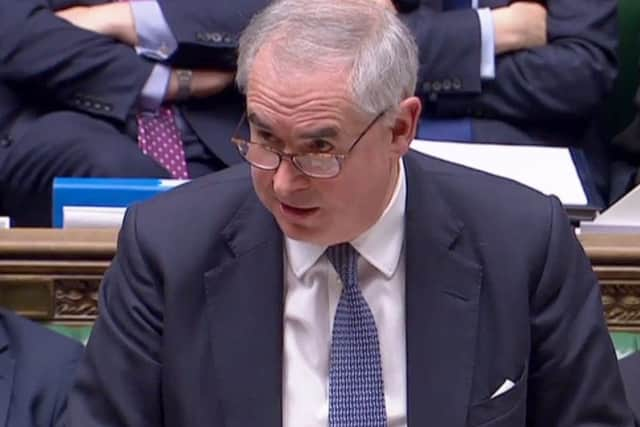Brexit: SNP's Ian Blackford claims Theresa May '˜lied' about legal advice
Mr Blackford was told to “rephrase” a question at Prime Minister’s Questions by John Bercow after telling Theresa May she had been “misleading the House, perhaps inadvertently” over whether the Irish border backstop was temporary.
Legal advice on the issue was published yesterday following a parliamentary row and a historic vote of contempt against the UK Government, which states the backstop could “endure indefinitely” if activated.
Advertisement
Hide AdAdvertisement
Hide AdFollowing PMQs, Mr Blackford told journalists: “Let’s call a spade a spade. On the basis of the legal advice, and the fact she had this legal advice when she spoke in the House of Commons, then she’s lied.”


Mr Blackford avoided formal censure after twice being rebuked by Mr Bercow during the exchange, but said later he had been prepared to be suspended from the Commons.
He said: “I understand there are conventions in the House and we have to be respectful of those conventions, but it’s absolutely conclusive.”
Mrs May has repeatedly said the backstop, which will come into force if a trade deal has not been agreed between London and Brussels by December 2020 and would keep the UK under EU customs rules, will be “only temporary”.


Legal advice provided to the Cabinet and published yesterday warns the UK could be stuck in “protracted and repeating rounds of negotiations” with no lawful power to exit.
And it makes clear that Brussels could apply to an arbitration panel for Northern Ireland to remain in the EU customs area while the rest of the UK left.
The six-page document by Attorney General Geoffrey Cox was released to MPs a day after the House of Commons found the Government in contempt of Parliament for trying to keep it secret.
Democratic Unionist Party leader Nigel Dodds described the advice as “devastating” and said it made clear Mrs May’s deal was “unacceptable” and must be defeated.
Advertisement
Hide AdAdvertisement
Hide AdThe Prime Minister rejected Mr Blackford’s claim the Government had been “concealing the facts on her Brexit deal”, insisting the document contained the same information as a statement made to MPs by Mr Cox earlier this week.
Shadow Brexit secretary Sir Keir Starmer said the document revealed “the central weaknesses in the Government’s deal” and will also be seized upon by critics of Mrs May’s deal in her own party.
Tory former chief whip Mark Harper warned the deal would collapse his party’s confidence and supply agreement with the DUP and leave them “unable to govern”.
In his advice, Mr Cox found the protocol setting out the terms of the backstop “does not provide for a mechanism that is likely to enable the UK lawfully to exit the UK-wide customs union without a subsequent agreement”.
“This remains the case even if parties are still negotiating many years later and even if the parties believe that talks have clearly broken down and there is no prospect of a future relationship agreement,” he added.
Under the arrangements, “for regulatory purposes GB is essentially treated as a third country by NI for goods passing from GB into NI”, he said.
Despite assurances from both London and Brussels that it is intended to be temporary, Mr Cox said the protocol would “endure indefinitely” under international law until another agreement takes its place.
The UK would have no legal means of compelling the EU to end any such agreement.
Advertisement
Hide AdAdvertisement
Hide AdThe Attorney General warned: “In the absence of a right of termination, there is a legal risk the United Kingdom might become subject to protracted and repeating rounds of negotiations.
“This risk must be weighed against the political and economic imperative on both sides to reach an agreement that constitutes a politically stable and permanent basis for their future relationship.
“This is a political decision.”
